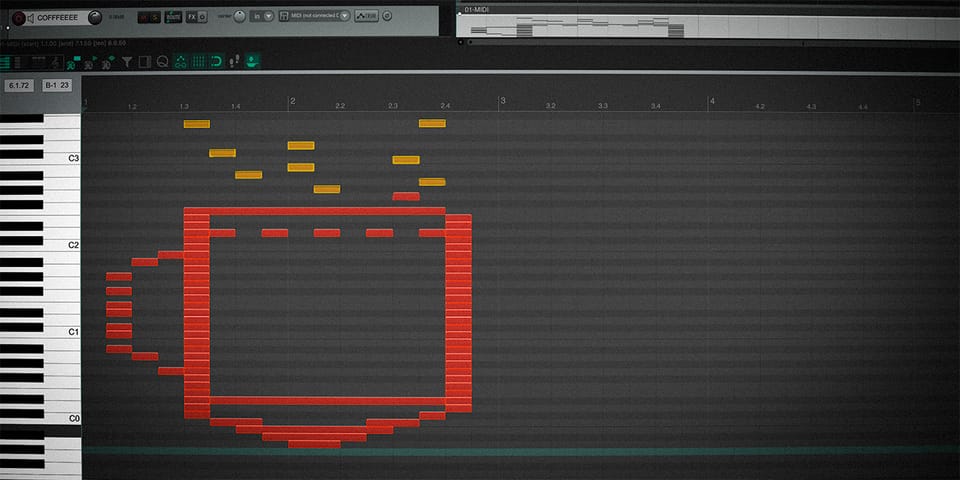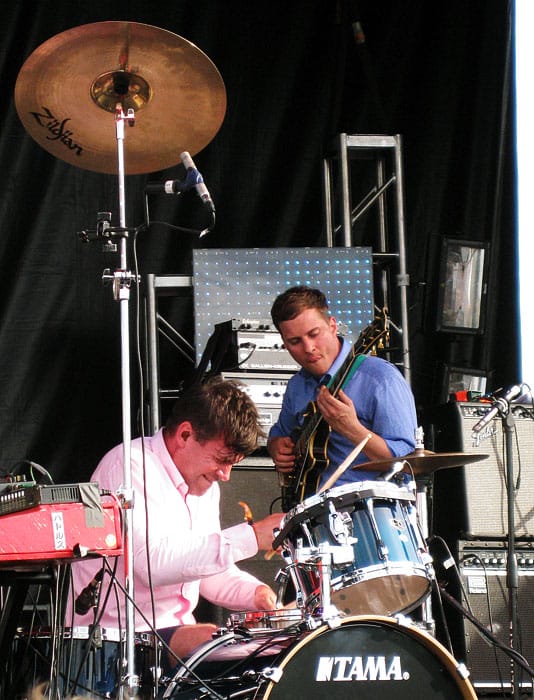IF DAWS WERE COFFEE

(Non-musicians: a DAW (Digital Audio Workstation) is a piece of audio software that functions like a virtual recording studio on your computer. It can record audio and host virtual instruments and effects. The DAW is usually the central hub for writing electronic music, and recording/mixing music of any genre, whether that's on a laptop or in the biggest professional recording studios.)
For the last decade and a bit Ableton Live has been my DAW of choice. Before that it was Logic Pro and before that Cubase. These shifts from one to another are big changes that take some getting used to, so I don't do it often. But over the last couple of months, I have committed to using a DAW called Reaper as my central tool not just for audio production, but composing too.
IF DAWS WERE COFFEE
Reaper looks and feels ugly. A huge departure from Ableton Live. If Ableton Live is a smooth, delicious pour-over V60 coffee you get in an indie Berlin coffee bar then Pro Tools is an unremarkable but reliable Americano and Logic Pro is a Starbucks latte in California with cinnamon sprinkles. Reaper is a treacle-like substance that you bubbled up from a scorched, moka pot on your hob, using old coffee bought in a Turkish supermarket years ago that you found in the back of your cupboard. No question that you're wielding something extremely powerful, but it is also gonna be an endurance test and fraught with danger.
In Reaper everything is automatable. All audio can be routed anywhere. There are matrices for whatever you can think of. You can customise everything, modulate everything. You can put MIDI and audio on the same track and it just doesn't care. You can create your own multi-step custom actions. You can batch process whatever you want. Have you seen that meme where people do speed runs to see who can recreate Crank That by Soulja Boy in Fruity Loops the fastest? In Reaper, if you really wanted to, you could make a button that does that for you in a single click.
It's a bit overwhelming, is what I'm saying. I've taken runs at it before and bounced off it. In particular its MIDI editor is nothing compared to Ableton Live, and MIDI is the core of everything that I write.
SO WHAT IS THE POINT?
Boring answer: if you know in advance that you're going to be working on a project that will involve not just coming out the other side with some pieces of music, but will also involve needing to be able to render that music in lots of variations and to varying degrees of granularity, keeping track of individual stems and samples and so on, then nothing beats Reaper's batch rendering matrix. It is immensely powerful.
Better answer: I do have a habit of deliberately putting obstacles in my way when I write music, and I am not exactly sure why. Often it turns out to be procrastination. Sometimes I wonder if it is based in some kind of repressed fear of failure, so I am baking excuses into the process in case I need them later. At other times though, I feel sure that it is a necessary part of composing for me. A way to shake things up, to find a new means of production, to expand my options. And this time I am confident that this particular switch to Reaper is me putting the good kind of obstacle in my way.
John Stanier, drummer of Battles, was previously known as being the drummer in Helmet. When he joined Battles, he changed the setup of his kit so the crash cymbal was extremely high, way over his head.

When questioned about this he said:
I didn’t want any cymbals but the hi-hats at first. Then I was like, “Okay, I’ll use one,” but I didn’t want it near me because I’d use it too much. So I set it high so I’d have to work to get to it. I wanted it to be significant; I use it as a marker. It’s like a master reset button when I go to the cymbal. Plus, it looks cool.
I agree. Looking and feeling cool should never be underestimated. Not only for rockstars, just as an everyday rule.
Reaper does not look cool. But it does make me feel a little more like a hacker when I'm using it, and that is cool. Switching to it also does for me what it feels like Stanier is implying regards his audacious cymbal praxis, which is that it forces me not to take the easy out. Not to lean too heavily on tried and tested techniques. To rethink how I approach my composing. To make myself have to expend energy to make a thing happen. To stay engaged.
So I am going in deep. I am leaning into the Reaper mindset. I am making my own custom actions. I am constantly making mistakes because of my Ableton Live keyboard shortcut muscle memory. I am grappling with what is surely the worst MIDI editor of all time (or have I just not found the right settings yet? Maybe it's the best MIDI editor of all time!?) I am trawling the forums reading decade-old posts to figure out if drawing fx automation lines is actually supposed to be this difficult, or if I just haven't found the right sub-sub-sub-menu that hides the 'make drawing automation lines easy instead of impossibly hard' tickbox.
All these glamorous, romantic rock'n'roll activities that go into making lots of noise, huh.
Surely it is called Reaper because of the amount of users who have uttered 'this software will be the death of me' while grappling with it.
DIALECTICS AGAIN OH NO
Anyway. Like most other blog posts here, we end on a dialectic. Because I think it is good to not get too precious about the tools of my craft. I want to be able to make music with whatever I have to hand and avoid platform lock-in whenever I can help it. I think changing things up and putting obstacles in my way is a good approach to composing.
But I could also write the total opposite and believe it whole heartedly. I think that it is good to invest the time and energy just picking one tool and getting to know it inside out. I think that putting as few obstacles in my way as possible can offer a more instinctive, unmediated, holistic approach to composing.
I want my music tools to be entirely trustworthy and known to me, but also eternally mysterious.
I think it is great that I don't care in the slightest about the state or quality of my guitars in 65days whereas Joe cares a lot about the state of his, and both these approaches are entirely correct.
And so I will continue my plight to learn ever-more confusing software and I will feel cool while doing it, even if I'm crying on the inside.
OTHER BUSINESS
That is pretty much it from Studio Komoy. Battling Reaper to make secret noises for a project I'm still not allowed to discuss.
One thing of note: there's going to be a charity event in Guildford next month. The 'Bonus Stage Orchestra' are doing a performance of music from various video games, including No Man's Sky. I don't want to overstate my involvement (I am not performing, neither is 65days) but I did dig out some never-before-released-except-inside-the-game 65daysofstatic music from the No Man's Sky Pathfinder update and put together a bespoke arrangement for them. They'll be performing that along with other NMS music from both 65daysofstatic and the game's audio director and sound wizard Paul Weir.

Should be good! For some reason I think it's technically games industry only, but tickets might be getting made available to the general public closer to the event. More info on that HERE if you're interested and in the area.

Member discussion